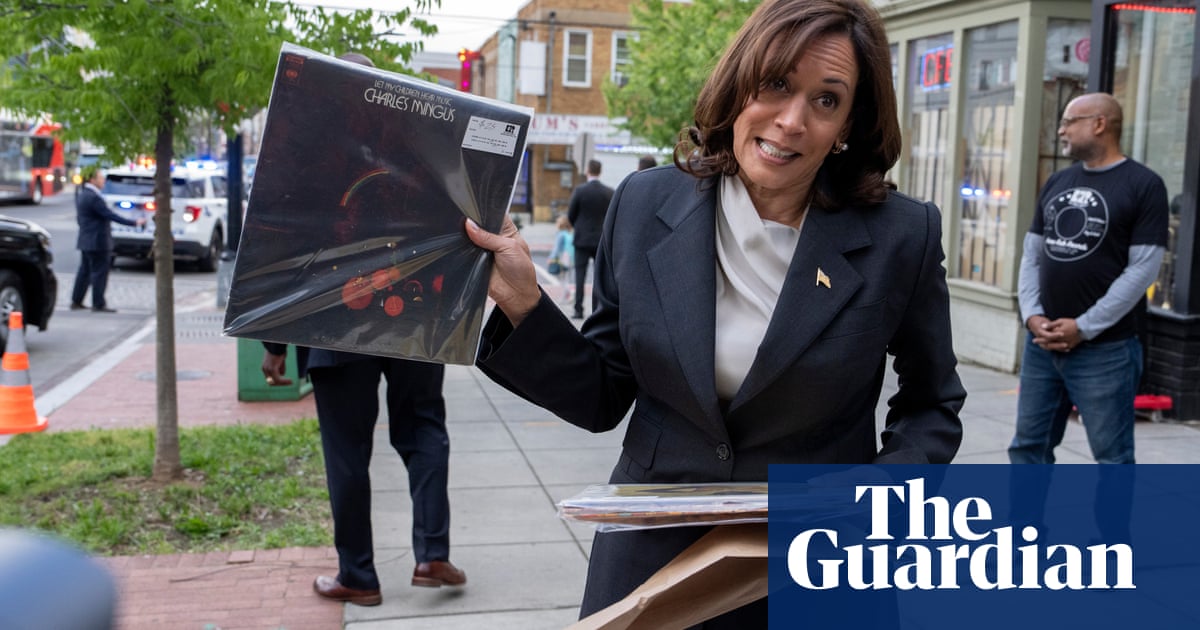Within moments of Joe Biden announcing his decision to hand his presidential campaign over to Kamala Harris, the greatest hits of her meme stardom re-entered circulation: the “We did it, Joe” call, the “Momala” interview with Drew Barrymore. Never mind callbacks to the vice-president quoting her Indian mother’s habit of asking, in frustration, “You think you just fell out of a coconut tree?”
Black Twitter users, however, quickly recalled Harris’s august history as the Black girl nextdoor – starting with the 2019 Breakfast Club interview in which Harris defended herself against charges that she was not “African American” because her parents were immigrants. “Look, this is the same thing they did to Barack [Obama],” she said. “I was born Black. I will die Black, and I’m not going to make excuses for anybody because they don’t understand.”
There will be countless stories about Harris’s record, voter support and her amorphous role as a headlining campaigner serving under a lame duck, one-term president unfolding through November. But what appears to be resonating most with many Black social media users in the wake of Harris’s surprise promotion is the cultural significance of it all. Here’s a woman who was Oakland-born and Berkeley-raised who has whiled away her share of Sundays in Baptist church.
Earlier this week the hashtags #WinWithBlackWomen and #WinWithBlackMen began trending while their eponymous organizations hosted separate video calls gathering support for the vice-president. And in those strategy sessions, which drew tens of thousands of participants, presenters made proud and repeated shoutouts to their “soror” Harris, a product of Howard University and the Alpha Kappa Alpha sorority – both historically Black institutions. Over the course of two days, the groups raised nearly $3m in a matter of hours.
Where the guest speakers on the women’s call tilted toward powerhouses of politics such as Jasmine Crockett and Donna Brazile, the celebrities on the men’s call – which was hosted by the media maven Roland Martin – ranged from the film super-producer Will Packer to the Academy Award nominee Don Cheadle. “I’ve been a friend and a fan of her journey,” the actor-comedian Bill Bellamy said. “She didn’t just come from anywhere.”
Harris once traveled through the same Black Hollywood scene that defined fin-de-siècle Black culture. Longtime friends include the OJ Simpson expert Star Jones and 21 Jump Street lead Holly Robinson Peete, who visited the then senator at the California capitol in 2017 to discuss national legislation that would address the policing of Black teens with autism. (“We’re so lucky to have her as a friend and a fighter and a warrior,” Robinson Peete said on her reality show.)
For a spell in 2001, Harris dated the chatshow host Montel Williams; not long after the bombshell news of Harris’s promotion landed, Williams retweeted an endorsement of the vice-president from the Maryland governor, Wes Moore – who was also on the #WinWithBlackMen call. “We’ve got 100 days to make sure we protect the future for our children, our families, our communities and neighborhoods by making sure we have a president of the United States who sees us, believes in us and honors us,” Moore said.
In Harris’s candidacy, there are unmistakable echoes of Obama, another immigrant’s son in whom Black voters readily saw themselves. This month, the two converged in Las Vegas to send off the USA basketball team before the Olympics, in clips that were widely shared. When Harris shook hands with Steph Curry, the Golden State Warriors star mentioned a letter the vice-president had sent following the birth of his fourth child in May. “I appreciate it,” Curry told her. The personal touch recalled another prominent hoops fan who worked in the White House.
Even Obama’s and Harris’s music tastes overlap. Where Obama gets rightful credit as the country’s first hip-hop president, from brushing off his shoulders to actually hobnobbing with Jay-Z, Harris is poised to break ground as America’s first b-girl in chief. After the 2020 Democratic national convention, Harris strutted out for her nomination acceptance speech to Mary J Blige’s Work That. “I was so surprised,” Blige told Bravo TV of Harris’s choice – a deep cut, she added. “That made me go back and listen to the Growing Pains album where the song came from. The lyrics in that song are, like, oh my God; I see why she [chose it]. I forgot what I wrote!”
Harris’s sharp ear was recognized again on social media again this week as streaming music patrons returned to her 2019 campaign playlist – a mix that includes A Tribe Called Quest, Jazmine Sullivan and Prince. But to hardcore crate-diggers, Harris’s coolest music moment remains her 2023 shopping trip to Black-owned HR Records in Washington DC that saw her come away with vinyl albums from Charles Mingus and Roy Ayers and the Porgy and Bess studio album by Ella Fitzgerald and Louis Armstrong. “She knows her music,” the store’s owner, Charvis Campbell, told DCist. “I tried to give her a softball and give her Coltrane. And she was like, ‘No, no, no. Where’s the Mingus?’”
Not long after Harris replaced Biden as the Democratic presidential frontrunner, Beyoncé gave her permission to use her song Freedom – Harris had walked out to the 2016 track for her first appearance as a presidential candidate. On Instagram, the radio host DL Hughley posted a remixed video of Kendrick Lamar’s Not Like Us diss record that includes Harris highlights (her strolling with another Black sorority, her dancing with an umbrella in the rain) intercut with photos of Donald Trump with Jeffrey Epstein. “Who did this?” Hughley wrote. “Y’all quick!”
In the coming months, there will be those who question Harris’s pop culture credentials. But to her supporters in the Black community, online and beyond, every time Harris reflects the culture, she leaves no doubt about who she is.

